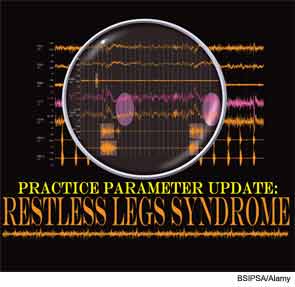
Explore This Issue
December 2012The American Academy of Sleep Medicine (AASM) recently published new practice parameters on the treatment of sleep-related movement disorders, entitled “The Treatment of Restless Legs Syndrome and Periodic Limb Movement Disorder in Adults—An Update for 2012: Practice Parameters with an Evidence-Based Systematic Review and Meta-Analyses” (Sleep. 2012;359:1039-1062). The new parameters, an update of a 2004 guideline (Sleep. 2004;27:557-559), provide new recommendations for medical treatment based on the most current evidence.
According to Lee Shangold, MD, assistant clinical instructor of otolaryngology-head and neck surgery at Stony Brook University School of Medicine in Long Island, N.Y., these new practice paramenters provide, for the most part, an easy way to determine the standard of care for treatment of sleep-related movement disorders, primarily for restless legs syndrome (RLS).
For Dr. Shangold, one of a subset of otolaryngologists who are also certified in sleep medicine, these practice parameters may be particularly applicable. However, he also emphasized that all otolaryngologists must be aware of all conditions, including sleep-related movement disorders, that may affect sleep, to ensure that patients with disturbed sleep affecting daytime functioning are correctly diagnosed and treated.
Pell Ann Wardrop, MD, an otolaryngologist and medical director at the St. Joseph Sleep Wellness Center in Lexington, Ky., and chair of the American Academy of Otolaryngology-Head and Neck Surgery (AAO-HNS) Sleep Disorders Committee, agrees. “Otolaryngologists need to be aware of leg movement disorders, because a large number of patients with sleep apnea have an additional sleep disorder,” she said. “We need to be aware of all of the sleep disorders so that we don’t miss those patients with a sleep disorder other than, or in addition to, sleep-disordered breathing.”
Medication Recommendations
The primary focus of the 2012 updated practice parameters is the medical treatment of idiopathic RLS. Although the guideline also mentions periodic limb movement disorder (PLMD) in the title, the lack of evidence on this condition did not permit providing recommendations on its treatment.
According to R. Nisha Aurora, MD, a sleep specialist and assistant professor in the department of internal medicine at Johns Hopkins
Leave a Reply